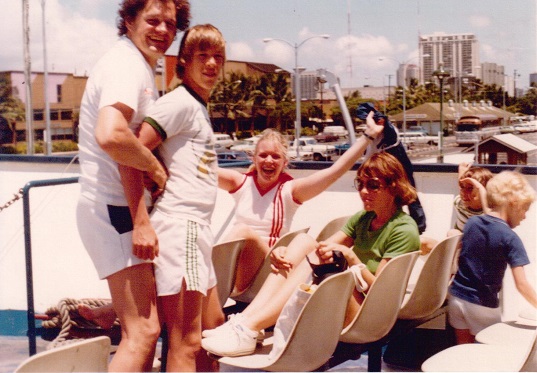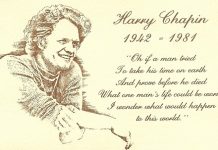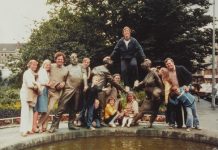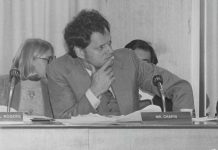By Ira Kantor
Photos Courtesy Chapin Productions LLC
The life of Harry Chapin, charismatic musician and iconic humanitarian, was unexpectedly and tragically taken on July 16, 1981. He was 38 years old.
A human dynamo whose sheer tenacity landed him on the Billboard charts, on Broadway, in the White House, and at the forefront of the world hunger movement, Chapin lived by the mantra of “When in doubt, do something.” In following this mentality, Chapin’s 10-year solo career encompassed more than 2,000 concerts, nine studio albums, the creation of global nonprofit World Hunger Year (now WhyHunger) and the love and respect of fans, fellow musicians and key political influencers alike.
Hailed as a consummate musical storyteller, Chapin is best known for his character-driven tunes —“Taxi,” “Sniper,” “W-O-L-D,” “A Better Place to Be,” “30,000 Pounds of Bananas” and “Cat’s in the Cradle” included. Yet despite having only four Top 40 hits to his name, Chapin’s songs remain one of a kind — elevating him to the same artistic status as classic singer-songwriters of the era like James Taylor, Jim Croce, Gordon Lightfoot and John Denver.
Nearly 40 years after his death, the following 10-part oral history seeks to tell Harry Chapin’s story through the firsthand, on-the-record testimonies of the “characters” who knew him best – more than 50 family members, friends, business and political associates and musical contemporaries. For added context, Harry’s own voice, along with other relevant news articles and reviews during his lifetime, are included in italics.
While there are other individuals and events crucial to Harry’s tale who were unable to be interviewed or showcased for this series, this still seeks to provide a well-rounded retrospective of a man whose life, being, sense of accomplishment and legacy remain unsurpassed to this day.
***
Chapter VIII
THE ROCK
Howard Fields (Drummer): Whenever (Harry) wasn’t doing something tied to his music career or tied to his political life or tied to his benefit life, all the time that was left over he would be home.
Gordon Lightfoot (Musician): Harry had a large family and he cared about his family a lot. You know, his being on the road, he tried to keep everything down to a dull roar as well as he covered the road life. It was tough. I know I could never do it 100 percent. I paid for it too as time went by.
Don Ruthig (Personal Assistant): Harry used to get himself in trouble because he would know that he wasn’t spending enough time with his family because he was out on the road or whatever. I think (Sandy) would get kind of on his case a little bit about it, and then he would make this commitment, ‘OK, Sandy, I’m not going to take any more gigs. I’m going to take this month off.’ That would last for about three days. So while he knew that he needed to spend more time with his family, there was always something else that needed to be done, and there was always something that came up that kind of took him away from it.
Shelly Schultz (Booking Agent): I don’t know this for sure, but I think Sandy probably had a tough way to go with him. He was not attentive. He was always on the road.
Big John Wallace (Bassist): Let’s just say I think it involved a little address book. The way I remember it, an address book was found that had 73 names in it. I think things started going downhill from there.
Sandy Chapin (Wife): There definitely was some kind of black book address book. That’s part of the life that Harry lived on the road.
Josh Chapin (Son): I can pretty much guarantee that he stepped out of the relationship. It was just a reality of his ego, his insecurity of what he needed to be fed when he was younger. My mom was very conscious of it. One of the reasons that he was able to communicate with so many people in such an intense level and such an intimate level was because he was flawed. He knew he was flawed. He would admit to you that he was flawed.
Jono Chapin (Son): The other thing that happened with Harry is you sort of got snippets, you know I mean? We had concentrated time when we had fantastic opportunities to go on extended trips to Europe and Australia and different places around the world, but then there were periods during the school year where he was off doing concerts. When he might be around you could be in school or when he was around, it was kind of like, ‘All right, hey, everybody jump in the car, we’re going to a movie’ or going out to dinner and then going out to a movie and it was kind of like a pretty big hit and run. You know, ‘Here it is. This is what we’re doing; this is the game plan.’ It’s a different way of life. I certainly sort of adjusted to it and rolled with it and I think it’s just the way you grow up and you kind of adapt to things. So it’s funny because when I sort of operate that way with other people it can throw them.
Jason Chapin (Son): When we moved to Huntington, there was more going on all the time. We had this music room in the house where he would go in and either listen to music or he would write lyrics or he would be working on some other non-music project. There was always something going on. A lot of times when he was away it was pretty normal around the house. We had our routines with school, with sports and friends and family. Then when he came home it was like a mini hurricane. There was always somebody coming by to meet with him or he was on the phone with somebody and we would go out to dinner and we’d go out to the movies and he would try and do the normal family things, but when we did it with him, it was a little different because somebody would recognize him.
Sandy Chapin: Here’s an example of Harry at home relaxing. He’d be listening to a basketball game and he’d be writing a lyric at the same time. This was not unusual. Sometimes he got together with his brothers — there were family things. Mostly what he did with the kids is take them to sports events. We also did some plays and some Broadway shows. Sometimes school events. Both Jono and Jason were varsity captains and he got to a lot of their games because he could still get to an evening concert a good part of the time.
Here’s an example of Harry relaxing. Everything he did he had to conquer the universe so he liked to take a Caribbean vacation. But every time had to be a different island. So my feeling about this was, OK, the first day you’re traveling, the second day you figure out where the heck am I, which island is this and you kind of get a little oriented, and then the next day you’re on vacation, and the next day we’re leaving because they were always three or four day vacations. The way Harry operated, he’s working the whole time. He’s working the phones at the airport until he jumps on the plane. He’s working on the plane the whole time and then we’d get there — he called them writing vacations and they were three or four days — and then he’s on the phone when we get there and he’s writing and then he’s working and writing and then we go back to the airport and as soon as he gets off the plane he’s on the phone again and working on whatever is happening later that day, the next day. That was his idea of relaxation.
One time he read an article or somebody talked to him or something – he came home and he said, ‘I was reading this article…about A-type personalities and it says [when] an A-type needs to take a vacation, that they need a minimum of 10 days to two weeks in order to really shut down and relax’. So he said, ‘It’s your responsibility that from now on when I take a vacation it’s got to be 10 days or two weeks.’ That was his announcement. I always remember that one. That was one of the best: ‘It’s your responsibility to see that I take a vacation of at least 10 days.’
Jaime Chapin Miller (Daughter): Harry was a force of nature. We never knew what would happen next when he blew in the door. Would we be going bowling, on a boat ride, planning our next family trip, or something else?
Jason Chapin (Son): We liked to go on family vacations and my mother always wanted to make them educational. We went to Greece and learned all about Greek history, and we went to Egypt and visited the pyramids. And then he’d start incorporating some tours because my uncle was in the military and so he was performing on a lot of military bases in Europe. We would go do some sightseeing and some tour stuff in the day and then he would do a concert at night and then we’d go on to another country or another city and repeat the whole thing for about a week or 10 days. I remember another European vacation where he invited a lot of his uncles and a lot of my uncles and aunts and their families so there was something like 17 of us in two VW buses going from place to place. It was a little chaotic but very memorable. I think there was one trip in England with some other relatives and then there was another trip in Germany and maybe France.
Sandy Chapin: He was very much a pied piper. I think it’s a trick for parenting — if you do something that you really enjoy doing, then the crossover to the kids is going to take hold and Harry always did that. You know, he used to always like doing something that he enjoyed and saying, ‘Hey, this is going to be fun,’ and getting them all in this and so he did homework, he did swimming lessons; he taught each one of them to swim out at Andover and then a lot of just packing everybody into the car. A lot of sports with the guys later on.
Jen Chapin (Daughter): His hit song was “Cat’s in the Cradle.” He had his hypocrisy in his face every single day. He definitely made up for it in a lot of ways when he was home. I say that even though I didn’t get to be a teenager because he died when I was 10, I got a preview of that experience of being completely horrified by your parents at a young age because he embarrassed me so terribly as an 8-year-old.
Jaime Chapin Miller: He had a great parenting style — ‘We’re going on an adventure, you’re going to have a great time, and you’re going to thank me for it.’ This was often met with groans: ‘Uh oh, what next?’
Jen Chapin: We were always going somewhere. He would come home and then be instantly like, ‘OK, where are we going? We’re going bowling.’ ‘Daddy, I don’t want to go bowling.’ ‘You want to go bowling; I heard you in your sleep last night saying, ‘I want to go bowling! I want to go bowling!’ C’mon, c’mon let’s go.’ Always activities, keep it moving, keep it going, build a project, go to a restaurant.
The normal thing was like going on some crazy thing. I always say we’re the only family that like went to every museum in Hawaii.
Terri Klausner (Performing Artist): There are certain songs that, for me, when I hear them they just stick in my heart and my soul — “Cat’s in the Cradle” being one of them. When I started to hear other music of Harry’s that I wasn’t familiar with, like “Tangled Up Puppet” — to this day when I hear that song or sing that song or when I hear “Cats in the Cradle,” if I really go into my heart when I hear them or sing them, I can’t do them without crying. There’s just something so human and touching in the heart about them.
“Tangled Up Puppet,” one of the lyrics in that is a mother singing to her daughter: “I’m a tangled up puppet, all gathered in your strings. I’m a butterfly in a spider’s web fluttering my wings. And the more that I keep spinning out in knots, the more I see what used to be and the less of you I’ve got.” It’s a story of a mother singing to her daughter watching her daughter grow up and how they used to play and then she was the be all and her end all in her daughter’s eyes until her daughter found other things and moved on and it became makeup and boys and her own life and the mother just reminds the daughter just don’t forget I’m always here and will always be here and you’re the most beautiful woman I’ve ever seen. Even saying it makes me cry. It’s just a beautiful, beautiful story.
Harry really wrote some beautiful stuff.
***
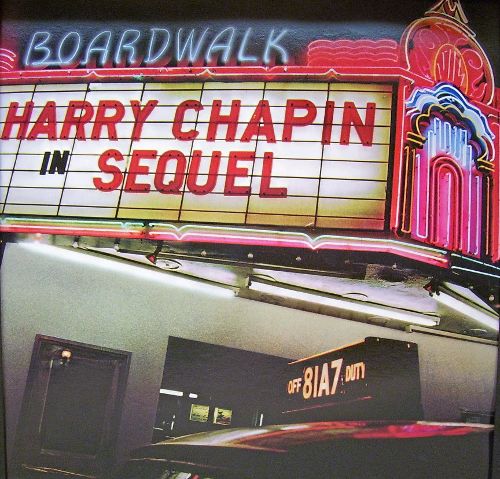
SEQUEL
Fred Kewley (First Manager): “Sequel,” had I been there, I would have really fought against that. I mean that looked like a last gasp at riding some old wave.
Ken Kragen (Second Manager): Part of the problem was that I was in the midst of the heyday of Kenny Rogers and then I signed Lionel Richie, so I had two of the biggest and hottest artists in the country who I was personally handling. It was when he wasn’t getting the airplay or the sales that he had been and although we mapped out some pretty good campaigns with the record company I don’t think we ever really achieved any huge breakthrough. I wasn’t there during that period of time when things really broke big for him.
Nancy Heller (Friend): The albums never really were able to convey Harry the same way as interacting with him in person.
Sandy Chapin: Harry was very frantic in 1980 because he was doing benefit concerts for congressmen who supported food and nutrition issues, whether they were Democrats or Republicans.
Shelly Schultz: Normally he wouldn’t play a club but he was playing a club because he released a new record and he was doing the record, and as always Harry’s shows were really long. He loved to do long shows and he loved to talk. I was sitting with a colleague of mine, one of the guys who worked for me, and he said, ‘You know, Harry’s shows are great. The first 45 minutes are great.’ And I said, ‘And the next four 45 minutes’ will kill you.’ We always used to laugh about it.
Big John Wallace: I remember later on, maybe close to the end in ’81 when maybe we’d come back to a place and there were less people than there were the year before, that kind of thing. You could see it in his eyes. I remember a few times he had a little bit of a haunted look about him. But that was at the end.
Jen Chapin: He didn’t care about sleep, and you really hear it. Like if you ever hear Live at The Bottom Line, his voice is completely shot. He didn’t have enough hours in the day.
Nancy Heller: He was big. He lived big. He died big.
Howard Fields: We played with him right until the end. We were about to start a huge summer tour at the usual places we played at and we were looking forward to it. We had about a month off and then we were supposed to do the July 16 show out in Eisenhower Park in Long Island. That was the night of his fatal accident. But following that it would have been a whole summer tour.
***
Jason Chapin: It may have been our second trip to Hawaii. I remember we went to Oahu and we were up in Turtle Bay. Then we were at a hotel. There was a little bit of surfing. We went golfing one day and we had a lot of nice meals. I remember one time we went out to dinner and Alan Alda was there so my father went over and said hello to him. I remember that it was very relaxing.
Jono Chapin: We went to a Polynesian cultural center, which was pretty fascinating. Everything from eating poi and understanding the different islands and the different cultural traditions that various islands had was pretty cool. We went surfing and I can remember Harry’s stance up on a surfboard was instead of sideways where you think of skateboarding or snowboarding or so on, as I recall it he was up on the board facing directly forward and that’s how he was sort of balancing on the board. If I recall it, it worked.
I’m sure everybody remembers this because we were all out there and not too happy about it after a while. Harry was probably one of those people that had a little bit more experience than the rest of us and I was probably in a little bit of a macho phase, but there was a deep-sea fishing boat excursion that was planned I think sort of towards the end of the trip. I think it was suggested you could take maybe Dramamine, but I seem to remember choosing not to take the Dramamine and I paid for it as I believe other people did.
We got there, I don’t think we were all that far offshore but the swells were so big that when the boat was at the bottom of the swell you could not see land or the horizon line and of course then it was at the top of the swell. You’re talking about probably a differential of, I don’t know, 15, 30 feet at a time. Harry was strapped in and taking the Dramamine and was about as happy as a clam and hooked in a marlin. I don’t know how long the fight was but that sustained me. I mean you’re hurting when some of that motion sickness is really hitting hard, but he pulled that marlin in. We got to shore and it was a pretty good-sized marlin to my recollection. The spear of that, the point, God it must have been three or four feet long.
Josh Chapin: I remember a lot about that trip. I remember the deep-sea fishing; I was a little seasick. I remember my mom taught me to look out on the horizon to make me feel better. I remember golfing and somehow paring on a Par 3. I remember the golf pro my dad was playing with saying that I had such a beautiful, natural swing and how I could be a pro golfer; thinking, ‘You know what, maybe I will be a pro golfer.’
We were at the driving range — and this is one of those stories that no one can confirm but it’s pretty funny — I think my brother Jason shanked one, went off the tip of the driver or something, and bounced through some trees onto some pavement and through a car window like this big, and hit some woman in the head. Somehow we had to go over there and my dad had to be like apologize. It was absolutely ridiculous. It was completely a “Caddyshack” moment.
He’d usually combine (a vacation) with a tour so I guess this was one of the few times when he wasn’t singing or doing a performance there. But yeah, it was a great trip.
Sandy Chapin: He came home (from Hawaii) and he was home one night and the next day he was on the way to the city to meetings. We came home the day before he died.
I think he pretty much was calmed down. The original plan was that we were all going to go to Australia because he was going to have a tour. For some reason the tour fell through. I think enough of it didn’t go into place to make it financially viable. So he had the time set aside. Then he said to the kids, ‘OK, we have 10 days, or whatever it is, where do you want to go?’ I don’t know what the different suggestions were but anyway it ended up Hawaii. We were actually going to Hawaii to a resort. The boys wanted to do some surfing, which they did with Harry. They went fishing for tuna and he caught like a huge — we have a photograph of it — a huge tuna, he and the two boys. We did some touring and we went to the cultural center north on the island.
I would say that it was a complete vacation because he didn’t have any concerts, and he didn’t have anything to do but sports and recreation and toying around.
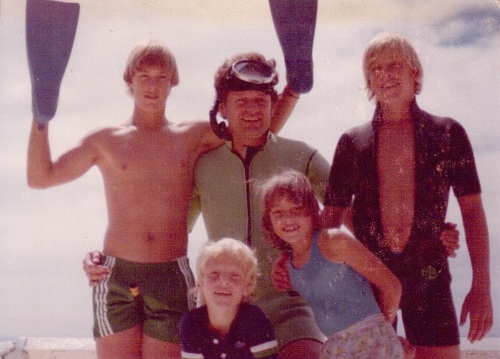
###
###
Share your feedback with Ira at vinylconfessions84@gmail.com.


